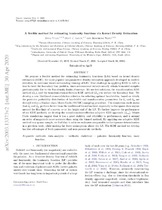A flexible method for estimating luminosity functions via Kernel Density Estimation

View/
Date
2020Author
Jarvis, Matt J.
Yuan, Zunli
Wang, Jiancheng
Metadata
Show full item recordAbstract
We propose a flexible method for estimating luminosity functions (LFs) based on kernel density
estimation (KDE), the most popular nonparametric density estimation approach developed in modern
statistics, to overcome issues surrounding binning of LFs. One challenge in applying KDE to LFs is
how to treat the boundary bias problem, since astronomical surveys usually obtain truncated samples
predominantly due to the flux-density limits of surveys. We use two solutions, the transformation KDE
method (φˆ
t), and the transformation-reflection KDE method (φˆ
tr) to reduce the boundary bias. We
develop a new likelihood cross-validation criterion for selecting optimal bandwidths, based on which,
the posterior probability distribution of bandwidth and transformation parameters for φˆ
t and φˆ
tr are
derived within a Markov chain Monte Carlo (MCMC) sampling procedure. The simulation result shows
that φˆ
t and φˆ
tr perform better than the traditional binned method, especially in the sparse data regime
around the flux-limit of a survey or at the bright-end of the LF. To further improve the performance
of our KDE methods, we develop the transformation-reflection adaptive KDE approach (φˆ
tra). Monte
Carlo simulations suggest that it has a good stability and reliability in performance, and is around
an order of magnitude more accurate than using the binned method. By applying our adaptive KDE
method to a quasar sample, we find that it achieves estimates comparable to the rigorous determination
in a previous work, while making far fewer assumptions about the LF. The KDE method we develop
has the advantages of both parametric and non-parametric methods.
